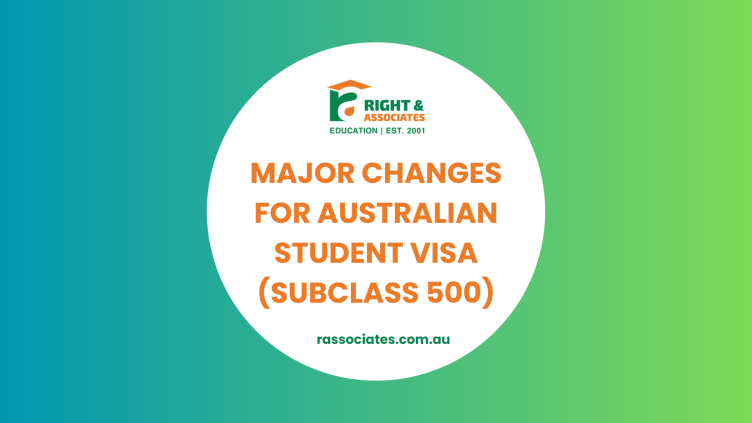The Australian government has recently introduced several significant changes to the Australian Student Visa regulations (Subclass 500). These changes aim to provide greater flexibility and opportunities for international students studying in Australia. This article will discuss major updates, including work restrictions, visa fees, post-study work rights, and the national minimum wage. At Right and Associates, we strive to inform students about the latest updates and provide comprehensive educational consultancy services.
Work Restriction
Starting from July 1, 2023, students holding the Australian Student Visa (Subclass 500) can now work up to 48 hours per fortnight while studying. This change allows students to gain valuable work experience and earn income to support their living expenses. It is important to note that the hours worked should not interfere with the student’s academic commitments.
Additionally, there is an exemption for students working in the aged care sector on May 9, 2023. They can continue to work unrestricted hours in the aged care sector until December 31, 2023. This exemption recognizes the critical role of international students in the aged care industry and aims to provide support during the ongoing COVID-19 pandemic (Work restrictions for student visa holders, 2023).
Student VISA Fee
Effective immediately, the visa application fee for the Australian Student Visa (Subclass 500) has been increased from AUD 650 to AUD 710. This adjustment reflects the government’s commitment to maintaining the quality of education and support services provided to international students. Prospective students must consider this change when planning their study abroad journey (Student VISA Subclass 500, 2023).
Extension of Post-Study Work Rights
The Australian government has extended the post-study work rights for eligible students to enhance opportunities for international graduates. Graduates who possess skills in the fields of health, teaching, engineering, and agriculture can now benefit from a two-year extension of their post-study work rights. This extension enables them to gain practical work experience in Australia after completing their studies and further contribute to the country’s workforce.
To determine the eligible courses for extended post-study work rights, students are advised to refer to the official list provided by the Australian government.
Updated Duration for Bachelor’s, Master’s, and Doctoral Degrees
The duration of post-study work rights for international graduates varies based on their qualification level. The recent changes specify the updated duration for different degrees:
- Bachelor’s degrees: The post-study work rights have been extended to four years.
- Master’s degrees: Graduates with a Master’s degree can now avail themselves of five years of post-study work rights.
- Doctoral degrees: Students who have completed a Doctoral degree in Australia can benefit from an extended period of six years for post-study work rights.
These changes offer international graduates more time to explore career opportunities and contribute to the Australian workforce (Addressing skills shortages in key industries and rebuilding the international education sector, 2023)
National Minimum Wage
As part of the government’s commitment to fair employment practices, the national minimum wage has been increased to AUD 23.23 per hour. This adjustment ensures that international students who engage in part-time work receive fair compensation. Employers must comply with this new wage rate when hiring international students, safeguarding their rights and financial well-being (Minimum Wages, 2023).
Conclusion
The recent changes to the Australian Student Visa (Subclass 500) bring positive developments for international students pursuing their studies in Australia. The increased work hours, extended post-study work rights, updated duration for different degrees, and the national minimum wage increase create a more favorable student environment. These changes aim to attract and retain talented individuals who can contribute to the Australian economy while pursuing their academic goals.
At Right and Associates, we understand the importance of staying up-to-date with these changes. Our experienced educational consultants are dedicated to providing comprehensive support and guidance to international students. We ensure that students are well-informed about the latest updates and assist them in navigating the visa application process seamlessly.
